Problem properties: Columbus' top code-violating landlords
On a warm Monday morning in May, two Columbus code inspectors carefully entered the Northeast Side apartment of Aydarus Farah.
Their shoes squished as they stepped in. Both the main floor and the second floor were flooded. Mold crawled up every wall. Drywall, heavy with water, had fallen from the ceiling and walls, revealing joists and studs black with rot.
The apartment had been so uninhabitable for so long that Farah, 73, spent weeks sleeping on a makeshift bed in the back seat of his car outside the apartment, where he continued to pay $1,050 a month in rent.
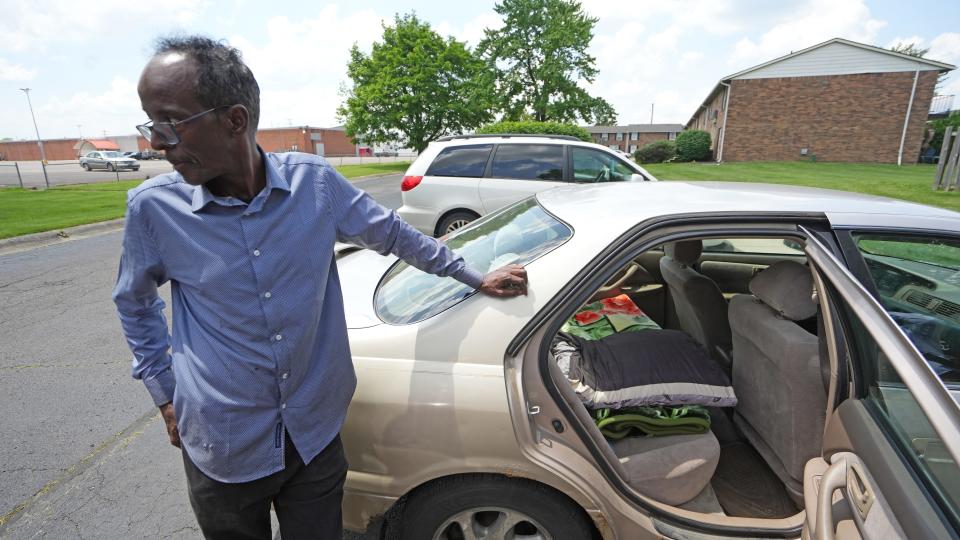
'Whac-A-Mole'
It wasn't the first time city inspectors had been to Farah's apartment or to others in the Carriage House complex, off Innis Road near Cleveland Avenue.
In fact, inspectors had cited Carriage House with 42 emergency code violations over the past five years, in addition to conventional violations.
During the same time span, Carriage House's owner, The Millennia Companies of Cleveland, had also been cited 17 times for emergency violations at its Park Place homes on East 26th Street in South Linden; 12 times at its Fair Avenue apartments in Olde Towne East and five times at its Cassady Village complex on the Northeast Side.
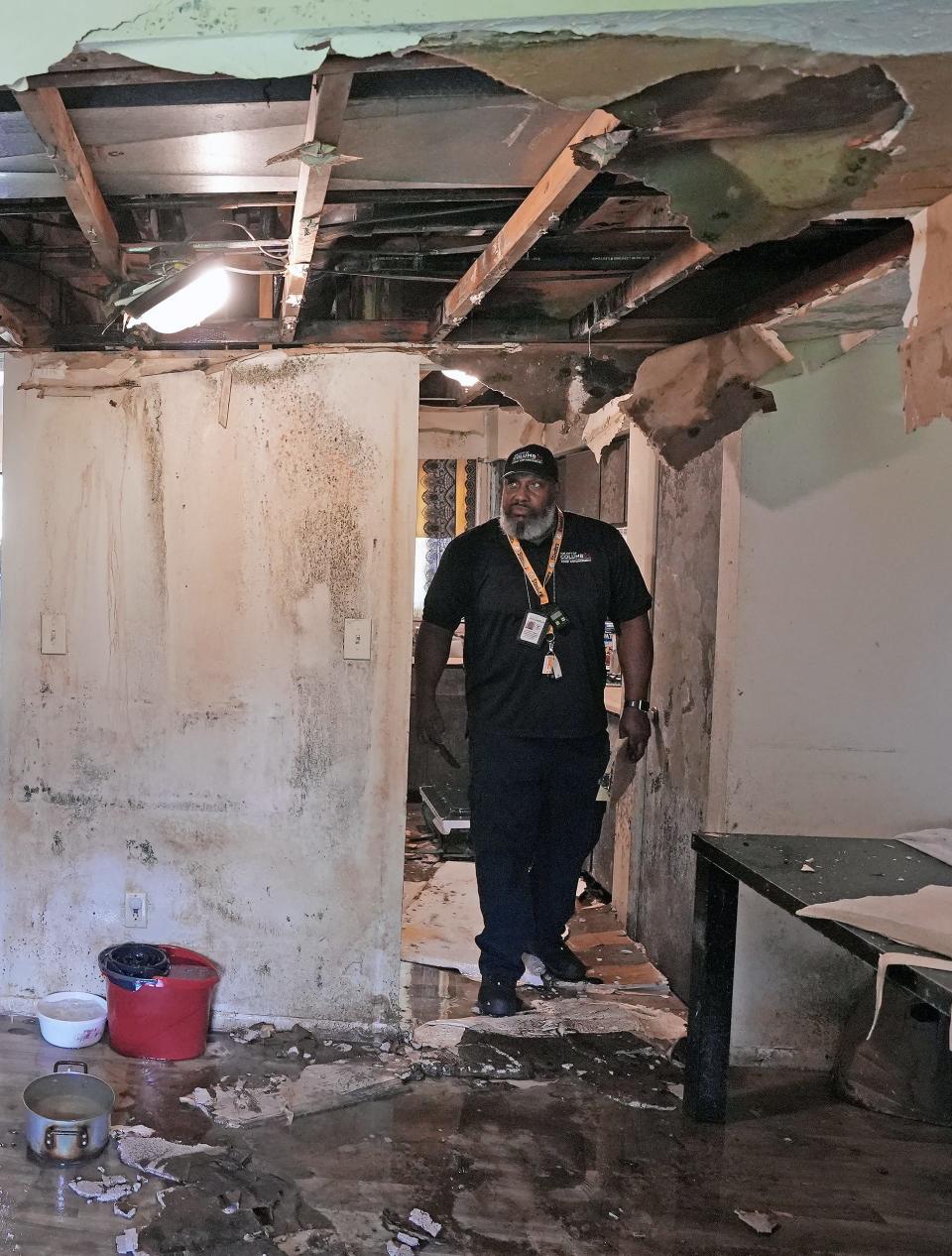
Emergency violations make up less than 5% of the city's housing and environmental health violations, which are dominated by non-emergencies such as overgrown weeds or improper trash disposal. But emergency violations are the most serious infractions; they include a lack of water or heat (in winter), sewage backup, exposed electrical wiring, a missing or non-functional smoke detector, or otherwise unsafe structures.
About 2,400 landlords were cited for nearly 6,000 emergency code violations between January 2019 and February of this year in Columbus. Most landlords had only one or two emergency violations, but a handful have become familiar to city inspectors. Together, the seven largest violators — including Millenia — account for more than 10% of all emergency code violations, a Columbus Dispatch analysis of city data found.
"It sort of feels like Whac-A-Mole sometimes," said Deborah Coleman, a city inspection supervisor.
The Dispatch looked into deeds, mortgages and other documents to discover common ownership of dozens of limited liability corporations that had multiple code violations.
By far the largest offender, with more than 200 emergency violations, is Apex Colonial, based in Newark, New Jersey, for its Colonial Village complex on the East Side. The complex went into receivership in 2022, then closed in December last year, prompting more than 1,000 residents to scramble for shelter.
Also high on the list is Paxe Latitude, the Lakewood, New Jersey, company that owns the Latitude Five25 towers, which the city shut down over Christmas 2022 after determining them unsafe for residents.
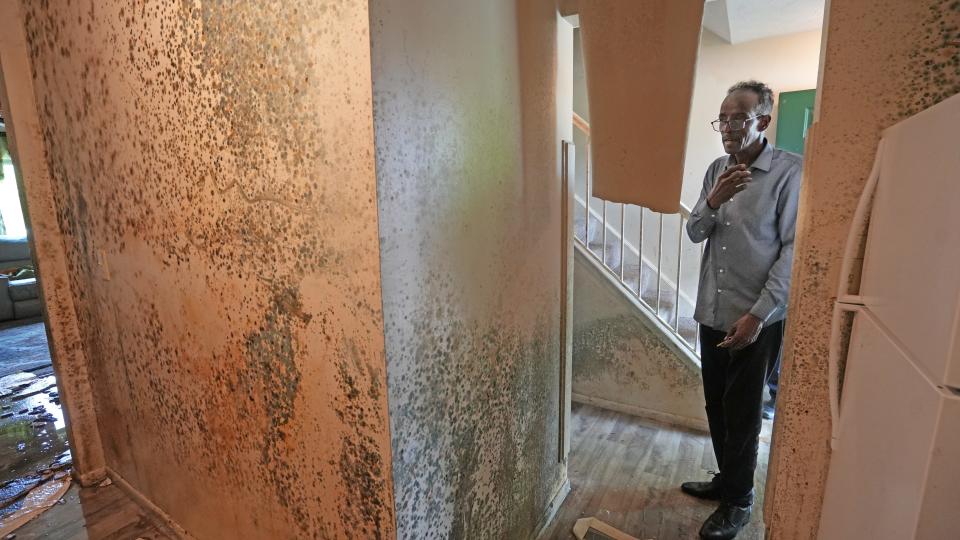
Other frequent violators are owners (or former owners) of Ardmore Village on the East Side, Southpark Apartments on the West Side, The Commons at Water's Edge on the Southeast Side and the Capital Park Apartments in North Linden.
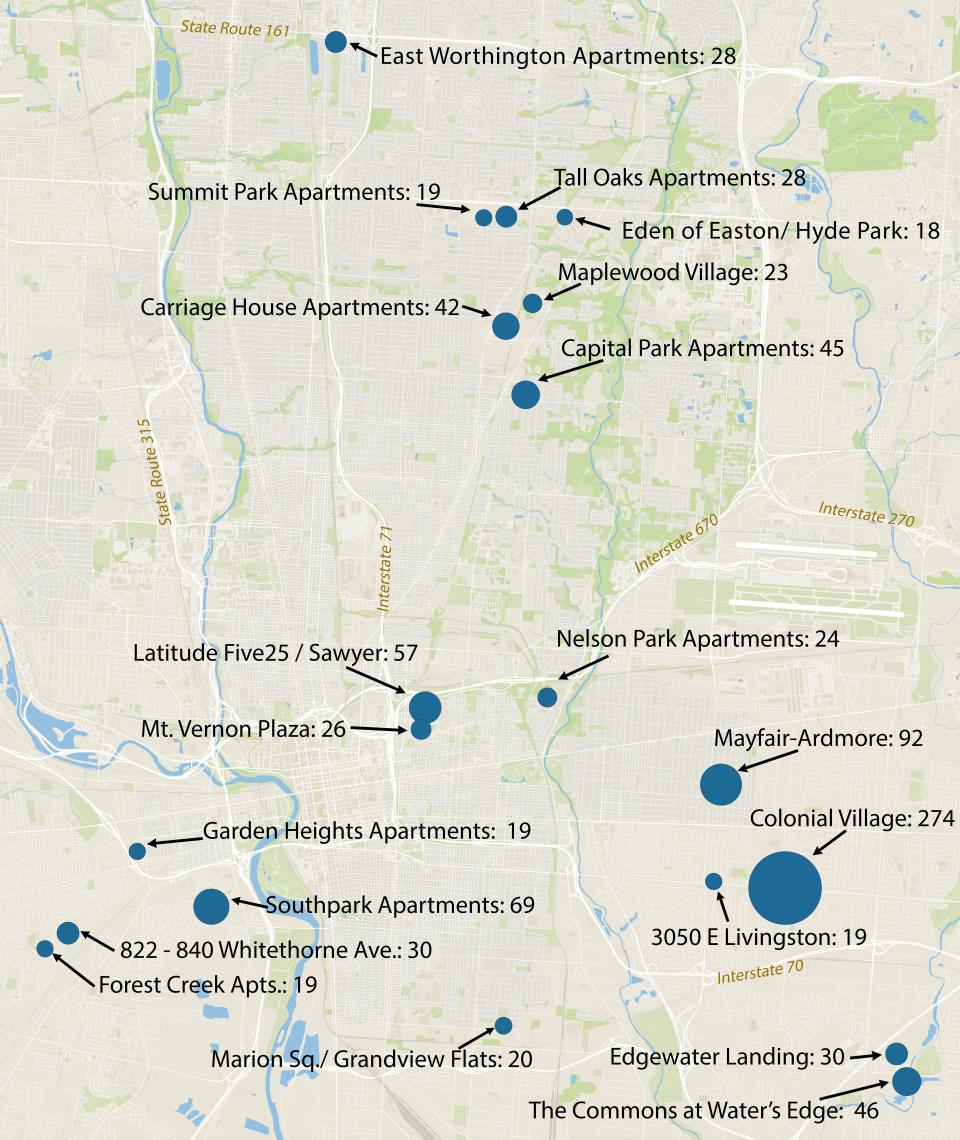
Many of the city's biggest code violators are out-of-town corporations that own large complexes across the nation such as Apex and Paxe Latitude (which the city believes share ownership), as well as Millennia and Odin Properties of Philadelphia. Others, such as VineBrook Homes of Dallas, own and manage single-family homes for rent.
For several of the landlords, their problems aren't isolated to Columbus. Millennia, for example, has been barred by HUD from receiving new federal housing contracts following a string of problems at the company's 280 complexes nationwide including a 2022 fire in a Little Rock, Arkansas complex that left three residents dead. Problems with the company's properties have sparked the formation of a tenants' group called Millennia Resistance Campaign.
Likewise, Apex Colonial's owners, Oron Zarum and Aron Puretz, have seen similar complaints of neglect for properties in Illinois, Indiana, Arkansas and Georgia. After a company Zarum owned stopped paying the utility bills for over 1,000 low-income apartments in Indianapolis, he was prevented from purchasing any new properties in Indiana for seven years in an agreement with the state's attorney general.
VineBrook, which rents single-family homes, settled a 2021 lawsuit with Cincinnati in June that alleged that it repeatedly violated the city's building, health and safety codes. Under the settlement, the city dismissed its claims against VineBrook, and the company agreed to adhere to the city's code.
Meanwhile, Paxe's owner, Boruch Drillman, recently pleaded guilty in federal court to a $165 million mortgage fraud conspiracy for deceiving lenders into issuing multifamily and commercial mortgage loans from 2018 to 2020.
Columbus City Attorney Zach Klein noted that some large complexes have gotten a lot of the city's attention in recent years after being bought by out-of-town investors.
"They milk it for everything that it's worth," he said. "They demand that you pay the rent on the first of the month, but they return no money back into the property."
Landlords respond
Many of the 10 largest violators did not respond to Dispatch queries about the violations. Those who did said they are seeking to remedy the problems.
"The Millennia Companies is aware of the code violations and has already remedied some of the concerns," the company said in a statement to The Dispatch. "The management team is working directly with city officials to further understand the remaining violations and develop a repair plan."
Link Real Estate Group, whose properties had 51 emergency violations in the past five years, said it is working hard to make repairs at its complexes, including by investing $12 million in improvements at the Commons at Water's Edge, on Refugee Road on the Southeast Side, which it bought in 2019.
Looking at emergency code violations alone provides an incomplete picture because it doesn't reflect how quickly violations are remedied, said Dimitri Hatzifotinos, an attorney with Willis Law Firm in Columbus, who said he represents "several" of the landlords on the list including 5812 Investment Group, which owns Eden of Easton.
"5812 has an unbelievable record of clearing maintenance requests," he said. "The fact that violations are issued isn’t the same as them not doing the work to fix them."
Hatzifotinos said many landlords with the most violations also own old apartments that are inherently subject to problems. He noted that one type of emergency violation, a nonworking smoke detector, is often the result of a tenant not replacing a battery. Smoke detector violations made up about 17% of emergency code violations among the top 10 code violators.
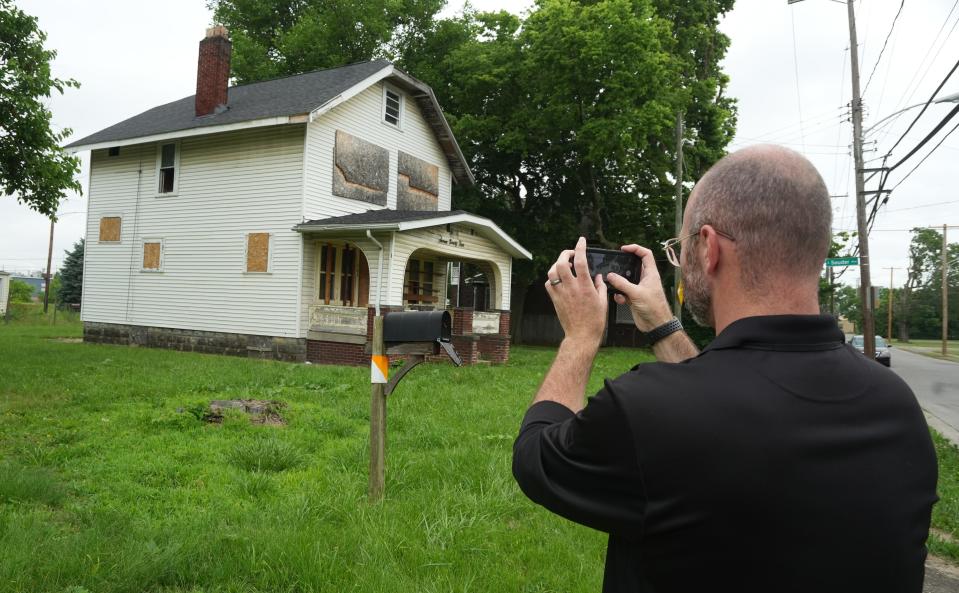
The Columbus nonprofit housing provider Homeport, whose properties had 40 emergency violations over the past five years (which places it outside the top 10 violators), dedicated additional resources last year to respond to issues and is "prepared to further expand our property maintenance capacity as needed," said CEO and President Leah F. Evans.
Some landlords may have more violations simply because they own more units, although few of the landlords with the most violations are the largest landlords in Columbus. Likewise, some landlords may have fewer violations because they were never reported by a tenant using 311 or caught during a proactive city inspection.
'Rats as big as groundhogs'
Not far from Farah's moldy two-bedroom, another Carriage House tenant, Anab Awalle, is dealing with leaky plumbing from an upstairs neighbor's apartment that has caused her bathroom and bedroom walls to swell and paint to chip.
Down the street, the Carriage House apartment of Farhiyo Dahir's mother has been without air conditioning and gas for cooking for months, Dahir said, despite repeated efforts to get management to fix the problems.
"They don't care," Dahir said. "There's nothing we can do."
Farhiya Ali said her aunt, Fadumo Dirir, has repeatedly sought help to fix her clogged sink and broken kitchen cabinets at Carriage House, but to no avail.
"This company is no good," Ali said.
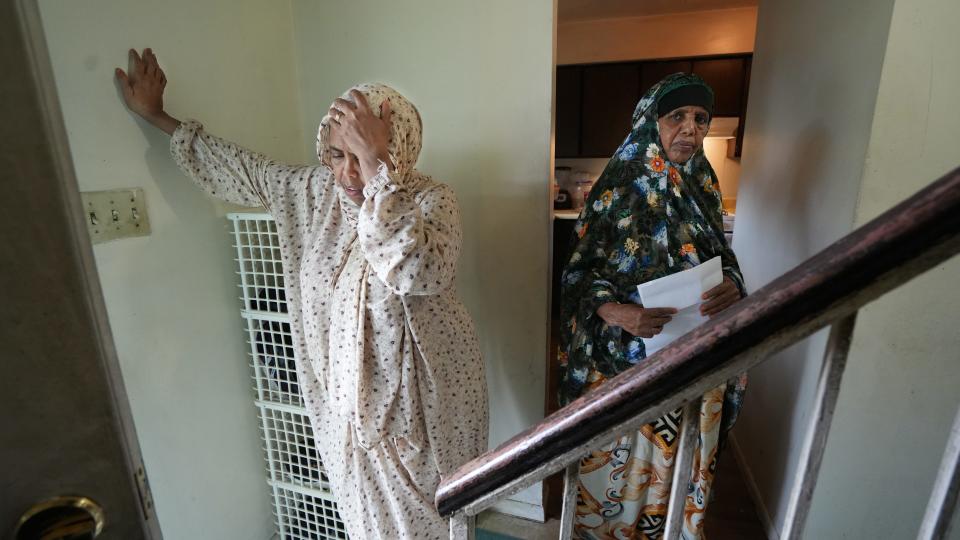
While the exterior and grounds of Carriage House are generally well-kept, residents have complained of rodents. In June, one caller to the city complained of "rats as large as groundhogs" in the complex.
Complaints at other complexes are similar.
In June alone, residents at Southpark Apartments, for example, complained of a sink backing up when a neighbor flushed their toilet, water leaking into the hallway when the shower is on, and air conditioners and ovens not working.
A growing problem
Emergency housing code violations have been generally trending upward in Columbus since 2008, although there was a significant dip with COVID-19 in 2020, according to city data.
Some experts say that as affordable housing becomes scarcer in Columbus, tenants are becoming more wary of reporting problems, fearing retaliation by their landlords — even though such retaliation is illegal.
"The supply-demand imbalance is so great now that I think it serves as a disincentive for landlords to invest in the maintenance of their properties," said Ben Horne, a legal aid attorney who specializes in housing cases. "They know if the tenant moves out, they'll get a new one."
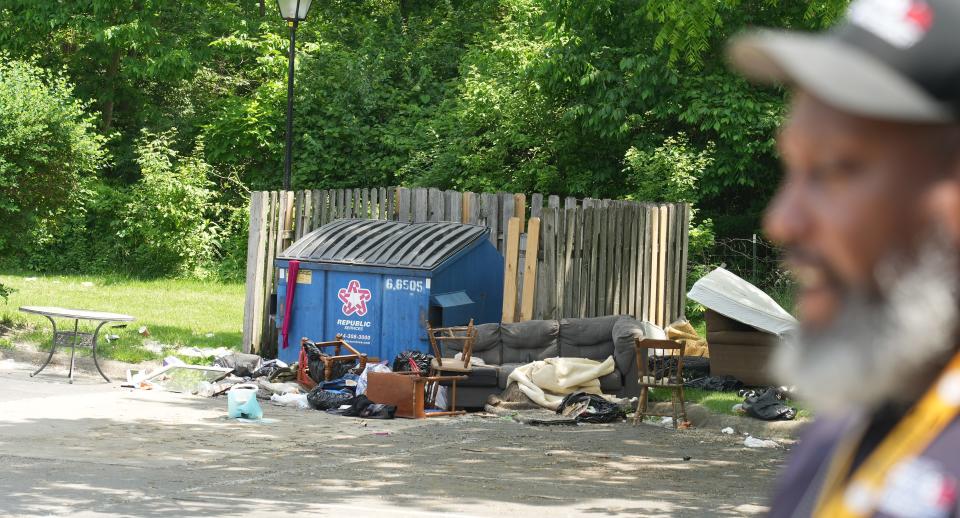
Though some landlords who purchase troubled properties invest in repairs, others seem to see them as a short-term investment. The Dispatch's analysis of auditor data shows that Columbus' top 30 problem properties were transferred about twice as often as the average county property.
Odin Properties, for example, racked up 68 violations at Ardmore Village from 2019 to 2023, when it owned the troubled complex. In an email to The Dispatch, Odin founder and CEO Philip Balderston noted that Odin no longer owns Ardmore. Balderston did not address problems at the complex while Odin owned it.
Code inspectors can issue notifications, but not fines
Every workday, around 70 code inspectors with the city's Department of Building and Zoning Services fan out across the city.
Coleman, who has been in code enforcement since 2001, said initial complaints usually come through 311, but inspectors often discover many more once they visit a complex.
"I've been to properties where I've literally had people jump in front of my car. ... some people are that desperate for help," she said.
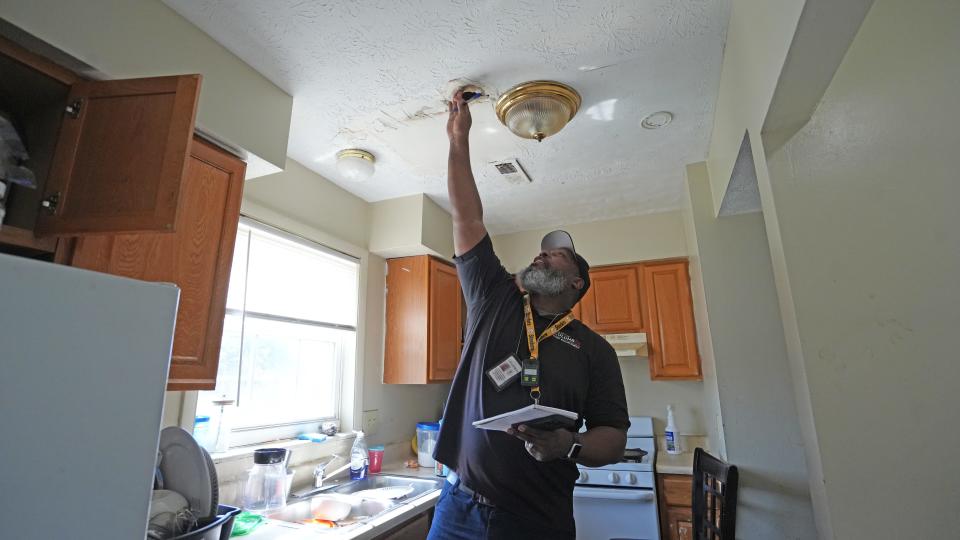
When they discover violations, inspectors' first step is to issue a notice to the manager and the owner — a process that can be time-consuming because many owners' identities are hidden behind limited liability companies.
In rare cases, inspectors will declare an apartment to be uninhabitable and make arrangements for the tenant to move. Typically, however, inspectors give the landlord up to 72 hours to remedy emergency violations, and longer for non-emergency violations.
"We try to get compliance," said Tony Celebrezze, Building and Zoning's deputy director. "We try to use the carrot more than the stick. ... We don't want to push people out of their house under an emergency situation. We want them to be able to stay there."
Columbus code inspectors cannot issue citations or fines, as inspectors in some other cities do, although Celebrezze said the city has considered pursuing that tool.
He said they have not done so yet because because a citation immediately turns the situation confrontational.
If a landlord makes no effort to fix the violations, city inspectors can prepare a legal case to forward to the city attorney's office, which can file nuisance abatement lawsuits against the landlord in Franklin County's Environmental Court.
"We're always trying to work with property owners. And I think it's important to note that most property owners are good people that want to do the right thing," said City Attorney Klein. "If you find yourself with a legal action against us, it's generally because you have refused to fix your property and so we have no choice but to bring legal action."
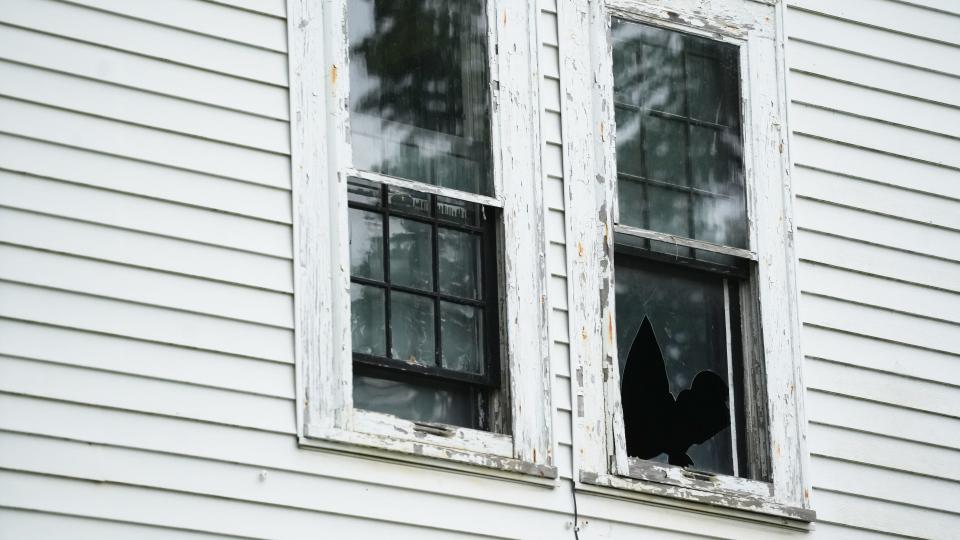
Heading to court
The city has sued hundreds of landlords for housing code violations during each of the last five years, including some of the biggest code violators like Apex Colonial, Paxe Latitude, Odin Properties and Millennia. In many cases, such as with Colonial Village and the Southpark Apartments, the city filed suits because of a combination of housing code violations and crime.
The city nearly always pursues civil, instead of criminal, action against landlords. Civil cases allow the city to bring in other parties such as managers and lenders, and allows the court to levy contempt of court fines and, in extreme cases, place a property into receivership, as happened with Latitude Five25.
Civil fines for unresolved violations can range up to $250 per day per violation, but it can take months for the court to mete out these sorts of punishments.
In rare cases, Franklin County Environmental Judge Stephanie Mingo has jailed repeat offenders. Columbus landlord Joseph Alaura, for example, was sentenced to jail in May for the third time for failing to maintain livable conditions at his 32 rental properties after the city found rodent and roach infestations, a lack of electricity, and other violations at his rentals.
The city has also created a "pro-active code enforcement" (PACE) team to investigate code violations in neighborhoods around the city in an effort to identify problem properties even if they haven't received specific complaints.
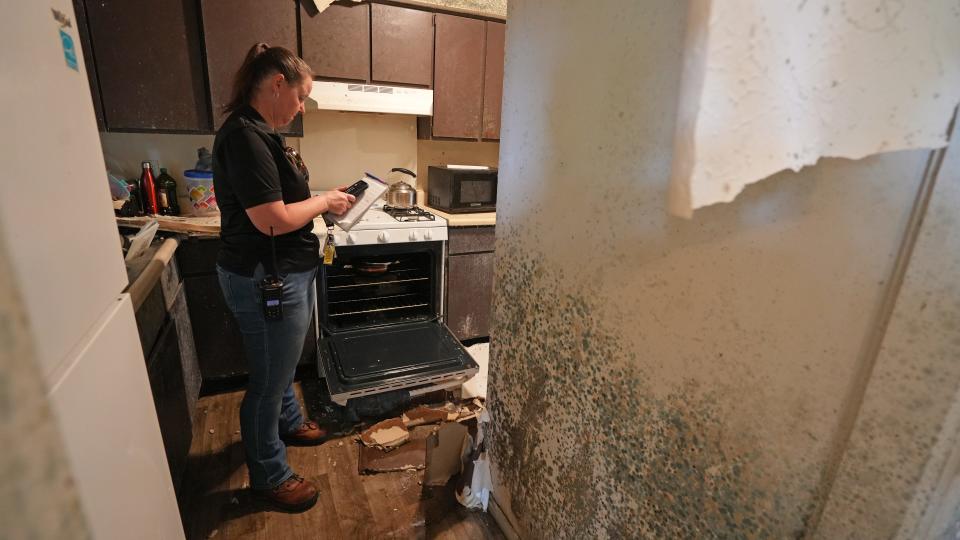
A double-edged sword
Columbus is in the midst of an affordable housing crisis. Only about a fourth of extremely-low income households are able to find housing in their price range, with the majority spending more than half their income on rent, according to a study by the National Low Income Housing Coalition (NLIHC) and the Coalition on Homelessness and Housing in Ohio (COHHIO).
While strictly enforcing city housing code can help ensure safe and sanitary living conditions, some experts say it can have an unintended side-effect. Repairs cost money — a cost landlords often pass on to their tenants.
Robin Bartram, a sociologist at the University of Chicago, studied her city’s code enforcement and rental data over a decade, and found that as code violations were fixed, rents went up.
“Landlords sometimes really do need to raise rents to cover the costs of making repairs. I think other times, landlords use repairs as an excuse to hike rents to try to get people who can pay more into their buildings,” she said.
Bartram said local governments can attempt to offset that effect by providing landlords money to undertake repairs in return for capping rent — as Pennsylvania recently did with its Whole-Home Repairs Program — though many officials are wary of giveaways for landlords, especially large ones that should be able to afford the repairs on their own.
Henry Gomory, a researcher at The Eviction Lab at Princeton University, said that the trade-offs between affordability and safe living conditions point to a need for more government-subsidized housing.
“If we think housing is a human right …(and) if it's not profitable for (landlords) to cater to low-income tenants while maintaining their properties up to code, then I feel like that points for the need for … public housing and other forms of social housing,” he said.
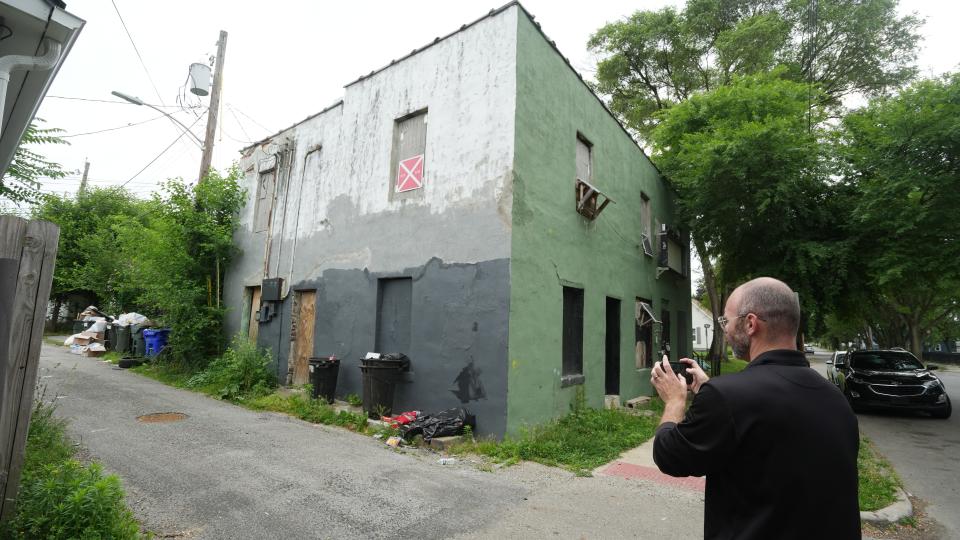
'No home, no home'
When inspectors discovered Farah's waterlogged apartments, they instantly deemed it uninhabitable and moved to find Farah emergency housing.
"I'm an old man," Farah said as he showed inspectors through what once had been his home. "Now no home. No home."
jweiker@dispatch.com
@jimweiker
This article originally appeared on The Columbus Dispatch: What landlords are the biggest violators of Columbus' housing code?

